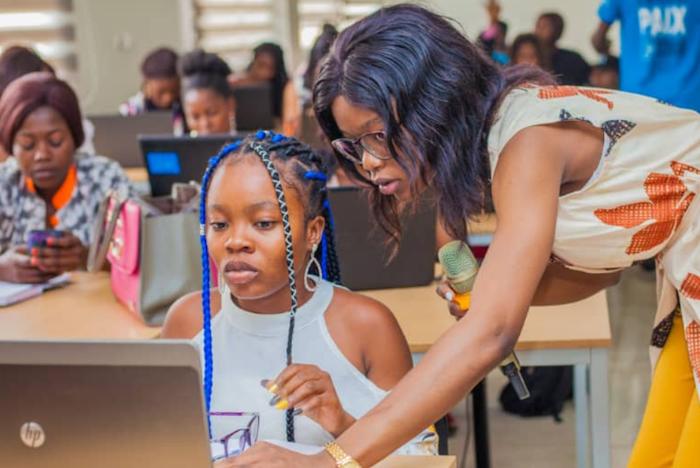Stories of purpose, commitment and skill from some of UNICEF’s inspiring Youth Advocates in Côte d’Ivoire, Trinidad and Tobago, India and Libya.
UNICEF is proud to have a community of Youth Advocates representing many countries from around the world. As members of UNICEF USA’s National Youth Council, we voice the concerns of youth in the United States and help ensure every child has the right to thrive and be heard.
Recently, we met with our representatives in Washington, D.C., to advocate for UNICEF’s annual funding and the MINDS Act. After a packed schedule full of advocacy meetings, we felt inspired knowing that our youth voices could help shape the lives of millions of children.
As we became more familiar with the advocacy engagement process in the United States, we were curious about how other youth leaders from around the world advocate for children’s rights. So we reached out to some international Youth Advocates.
For World Youth Skills Day, we’d like to share stories of purpose, commitment and skill from some of UNICEF’s inspiring Youth Advocates globally. We hope you’ll be just as impressed as we are.
Marie-Lucienne Affoué N’Guessan, Côte d’Ivoire
“I have studied computer science and noticed a low presence of women in the field. Being from a town far from the economic capital, I also realized the need for more training opportunities in remote cities. All of these reasons motivated me to initiate this project.”
In an increasingly digital age, Marie-Lucienne Affoué N’Guessan, 24, began to notice limited engagement and access to resources in digital professions for women and children. Studying computer science, she saw that women were underrepresented in the field, and decided to take matters into her own hands; she now leads Centre Marée de Lumière, an organization whose mission is to contribute to the digital inclusion of women, children and people from disadvantaged backgrounds in the digital professions.
Within her organization, her initiative Digital O’Féminin Tour operates in cities across Côte d’Ivoire, training women in skills such as digital marketing, e-commerce and web design. To date, Marie-Lucienne has trained over 500 young women between 18 and 35. She is a fascinating advocate, paving the way for young women in her local community to access new skills and opportunities. We cannot wait to see what she does next.
Priyanka Lalla, Trinidad and Tobago
“As young people, we are creative, innovative thinkers; we all have an equal role in mitigating and adapting to the climate crisis. We must work together in solidarity.”
Like Youth Advocates at UNICEF USA, Priyanka Lalla recognizes how critical young voices are in fighting our world’s most pressing issues. Now 17, Priyanka already has over seven years of advocacy experience. Her first project, the “Zero Waste Lunchbox,” redefined school lunches by replacing single-use plastics with reusable containers and biodegradable utensils.
Her advocacy gained traction across the wider Caribbean, and Priyanka continues to fight for environmental awareness one step at a time. She now leads the “Eat Green Live Blue” project, campaigning for more sustainable and healthy foods to promote and enrich youth nutrition.
Priyanka is also proud to be UNICEF’s first Youth Advocate from the Eastern Caribbean; she wants to make a difference because, as she says, “Passion is advocacy.” We couldn’t agree more.
Indraneel Acharya, India
“I wish to leverage my degree to receive opportunities to learn how to build great technology and my entire college life has one large looming question: “What cause do I dedicate my life to?”
There are times in our lives that are pivotal in a way that defines the timeline and introduces phrases like “then COVID happened.” What are challenging times for all of us can be eye-opening for young people like 20-year-old Indraneel Acharya, who dove in to help others in Bangalore, India during the pandemic.
Primarily partnering with YuvaSpark’s Impact Makers, a humanitarian initiative in India, he engaged high schoolers through a cohort-based volunteering model, working with over 600 volunteers from more than 35 institutions of different educational backgrounds towards education initiatives, and fundraised over $48,000 from more than 1,500 donors. He was also in charge of the organization’s Impact Makers 2.0 project, which focused explicitly on relief from the second wave of the pandemic.
Indraneel’s team conducted extensive need assessments at six government hospitals, nine primary health centers, three isolation centers and one primary COVID care center. These efforts engaged over 82,000 volunteers and allowed the distribution of ration kits, 100 of which reached transgender people, migrant workers and people from economically unstable communities. This work allowed patients to access to medical equipment like oxygen masks, oxygen concentrators, oximeters and PPE kits.
As if this didn’t leave us in awe, Indraneel’s work also helped support orphanages through the crisis by providing digital education implements and groceries. Currently, Indraneel is involved in the local student chapter of Rotary at the University of Illinois Urbana-Champaign and continues to support UNICEF’s work. He hopes to build a technology for social good firm in the future; we’re looking forward to seeing all he accomplishes.
Yasmin Elahmar, Libya
“Decision-makers need to collaborate with ordinary citizens to achieve positive change.”
Championing the urgent need to keep children happy and healthy even as the climate changes around them, 24-year-old Yasmin Elahmar, a Youth Advocate from Libya, says she “decided to become part of the solution and take action to reduce these problems.”
For her graduation project, Yasmin evaluated water quality in her city. As recognition of the problem precedes any action, Yasmin learned about deteriorating water quality, decreasing groundwater levels and the increasing frequency of droughts due to climate change. These problems, disrupting the critical health of children and youth reliant on a city-wide water system, required youth-mobilized change. Yasmin did not disappoint — she contacted news outlets and social networking sites to raise awareness about the critical situation in Libya.
However, as Yasmin asserts, “More needed to be done.” Joining the Libyan Organization for Environmental and Climate Action (LECAO), she initiated an information campaign with colleagues to educate the community about the importance of sustainable water resources.
These projects went beyond simply spreading a message; she also organized workshops and seminars on water management and climate change adaption, and developed campaigns to promote rainwater harvesting and unconventional water resources such as seawater desalination and wastewater treatment. Yasmin added a unique dimension to the city’s previously one-size-fits-all water system, inspiring us just as she contributed to the community around her.
Planting trees in the UNICEF yard and initiating tree-planting campaigns at different schools allowed Yasmin to involve other youth, helping transform her peers into activists and reinforcing something she already knew: “Decision-makers need to collaborate with ordinary citizens to achieve positive change.”
Her final takeaway is as heartwarming as it is inspiring. Yasmin says, “My love for my country and concern for our water resources’ future motivated me to work on this project. I believe that young people are vital in addressing environmental challenges, and we can be part of the solution.”
Written by UNICEF USA Youth Council members Aryan Gupta, Sherry Long, Rohan Menon, Radhika Sharma and Ayaan Siddiqui.
Learn more about UNICEF USA youth volunteer opportunities.
Read the full article here





